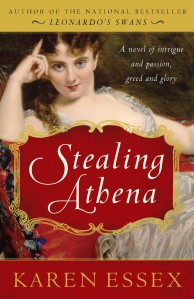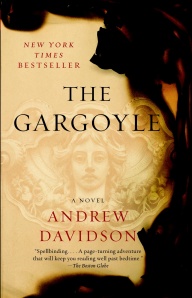A candid exchange between novelists Andrew Davidson (The Gargoyle) and Karen Essex (Stealing Athena) in which they compare their writing processes, talk about what it means to be a career novelist, how having a “readership” can change the way you work, and share other writers’ weird process stories.
 AD: How are you so unbelievably prolific? [Karen’s new novel is due in November.] Stealing Athena was only two years after the book that came before it, is that correct? Seriously I am in awe. How did you get another book out of your body so quickly?
AD: How are you so unbelievably prolific? [Karen’s new novel is due in November.] Stealing Athena was only two years after the book that came before it, is that correct? Seriously I am in awe. How did you get another book out of your body so quickly?
KE: I’m not sure how to answer that question, because people always ask me what my process is, and I always say my method is the obsessive-compulsive method of writing. Which is that once I get going on something, I almost don’t let it go. In a weird way. Someone once asked me if I took weekends off, and I just laughed, and I said, “I take my work with me to the bathroom.” And I wasn’t kidding.
AD: The interesting thing is that I write, I think, by that obsessive-compulsive method a bit as well, but what it ends up doing for me is dragging me off down alleyways that are incredibly fascinating, and I write twenty or thirty pages about, but I discover that it ends up being one paragraph in the finished work.
 KE: Right. Well, The Gargoyle was your first novel. Correct?
KE: Right. Well, The Gargoyle was your first novel. Correct?
AD: That’s right. Yes.
KE: And you wrote it without a deadline.
AD: Without any deadline whatsoever.
KE: Right. So I had the same experience. My first novel was Kleopatra, it took me about seven years from the time I thought about it and began to research it to the day I sold it, to what was then Warner Books. I did a lot of research that took me down fascinating alleyways, which had nothing to do, in the end, with the finished book. But I’m here to inform you that now that you’re a big success…
AD: Yeahhh….
KE: … you’re going to have to learn to write faster. And you will. My experience has been that you now have a readership, and your readership is waiting for you.
AD: My feeling in my case is that, umm, I mean I’m certain that I could put something out in two years, but I don’t know if my readership would be happy with it, because I know I wouldn’t be.
KE: I think this is one of the issues that we novelists deal with. This is what separates what I would call, for lack of a better word, a “career novelist,” you know, from someone who has a story or two in them. I think that it takes a brain-shift, almost, to transform oneself into a person who can write to satisfy a readership. And I don’t mean that that’s the primary goal, that we should be feeding product to our readers, but I look at people who are writing thick, idea-driven books like Philip Roth, and John Updike, and the late Iris Murdoch – these are all incredibly prolific people. So at some point I think they made that shift. And I think that you’re at the beginning now, so I bet you that if we had this conversation in five years into the future, you wouldn’t be so concerned about it.
AD: Well, you know, I think it’s interesting. Because I don’t think it’s necessarily – I completely understand what you’re saying, first of all – but I don’t necessarily know that it’s exactly what you’re talking about, as much as it’s just the different ways that people create. For example, I mean, in music, you’ve got, say, Leonard Cohen versus Bob Dylan. And at some point Bob Dylan was putting out an album every fifteen minutes, and Leonard Cohen puts one out every four years if we’re lucky. And that’s just how they approach it. And recently, I’ve been going through the work of John Fowles. And I’m absolutely loving his writing, and the books are so different, and he, I think, produced only seven novels in his life. Well, I mean clearly here’s a “career novelist” who is just not somebody who writes in quite that quick way. And it’s not better or worse, obviously. The one thing I’ve discovered in this last year and a half, where I’ve actually been meeting professional writers, because I didn’t know anybody before that, is just that everybody works in ways that absolutely surprise me. When I talk to other writers and they say, “Well, this is my method, this is my process,” sometimes it’s all I can do to keep from blurting out: “REALLY? That works for you?”
KE: I think my favorite weird process story is that of Graham Greene, who got up early every morning, put on a beautiful suit, wrote exactly five hundred words, would stop mid-sentence, once he had reached his five hundred words, was often done by breakfast time, and then would go sort of be a social butterfly, go and hang out with his wealthy friends on yachts in the Mediterranean.
AD: Which is not a bad process at all.
KE: No. Why can’t I learn that one?
AD: Yeah.
KE: I don’t really see it forthcoming, but that’s the process I would most like to learn.
You can read the rest of this conversation – in which they discuss the sometimes numinous, sometimes laborious procedures by which they create stories and bring their characters to life – and/or listen to the podcast, here.

